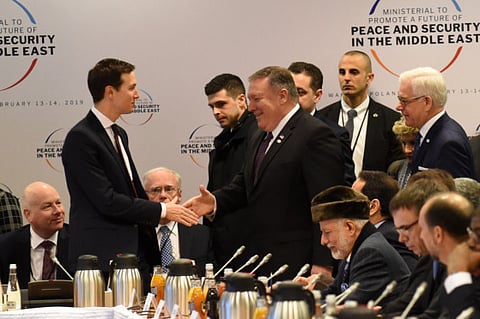Pompeo says ‘confronting Iran’ key to Mideast peace
Netanyahu attending key conference as well as several Arab states

Warsaw, Poland: US Secretary of State Mike Pompeo on Thursday called Iran the top threat in the Middle East, and said confronting the country is key to reaching peace in the entire region.
Pompeo, who was attending a security conference in Warsaw, met with Israeli Prime Minister Benjamin Netanyahu before the opening session at the conference.
He said “pushing back” against Iran was central to dealing with all the region’s other problems.
“You can’t achieve peace and stability in the Middle East without confronting Iran. It’s just not possible,” Pompeo said alongside Netanyahu.
The US and Poland are sponsoring the conference, which they say is aimed at promoting peace and security in the Mideast but appears to be mainly focused on isolating Iran. Iran has denounced the gathering as an American anti-Iran “circus” aimed at “demonising” it.
US Vice President Mike Pence is attending along with representatives from numerous Arab countries.
US Vice President Mike Pence demanded that European Union allies leave the Iran nuclear deal and warned of further US sanctions on Tehran.
Speaking at the conference Pence denounced Iran as the “greatest threat to peace and security in the Middle East” and accused the clerical regime of plotting a “new Holocaust” with its regional ambitions.
But France and Germany are not sending Cabinet-ranked officials, and European Union foreign policy chief Federica Mogherini is staying away.
Russia and China aren’t participating, either, and the Palestinians, who have called for the meeting to be boycotted, also will be absent.
Netanyahu considers Iran to be Israel’s greatest threat, citing its frequent calls for Israel’s destruction, its nuclear programme and support for militant groups across the region.
Israel has been active in recent months attacking Iranian targets in neighboring Syria.
The Americans have tried to broaden the scope of what was initially billed as an Iran-centric meeting to include the Israeli-Palestinian conflict, the fight against Daesh, and the conflicts in Syria and Yemen.
“No one country will dominate the discussion today nor will any one issue dominate our talks,” Pompeo said in opening the meeting. He acknowledged that eclectic nature of the gathering could produce views that “may even conflict with those of the United States.”
But he said he welcomed the dialogue since none of the region’s challenges will “solve themselves.”
‘’We must work together for security. No country can afford to remain on the sidelines,” Pompeo said.
President Donald Trump’s senior Mideast adviser, son-in-law Jared Kushner, has been working on an Israeli-Palestinian peace plan for close to two years, but has not yet released details.
US officials say Kushner is expected to make some comments in Warsaw about the conflict, but Netanyahu said he doesn’t expect any discussion of the peace plan.
The Palestinians have pre-emptively rejected it, accusing the Trump administration of being unfairly biased toward Israel.
Palestinian President Mahmoud Abbas’s spokesman Nabil Abu Rdeineh said Thursday that Middle East turmoil will continue unless there is a resolution to the conflict with Israel.
“There will be no peace and stability in the Middle East without a peaceful solution that leads to a Palestinian state with Jerusalem as a capital,” he said.
Pompeo addressed the conference in a closed-door session on US plans for Syria following Trump’s abrupt decision in December to withdraw American troops from the country.
That move led to the resignation of Defense Secretary Jim Mattis and caught many US allies by surprise.
No matter how the Warsaw conference concludes, the situation in Syria is more likely to be affected by another meeting taking place on Thursday involving the presidents of Russia, Iran and Turkey, each of which is deeply involved in the conflict.
Presidents Vladimir Putin of Russia, Hassan Rouhani of Iran and Recep Tayyip Erdogan of Turkey were meeting in the Russian Black Sea resort of Sochi to discuss a Syria peace settlement as expectations mount for an imminent and final defeat of Daesh ahead of the US pullout.
Netanyahu meets Omani FM
Netanyahu met one-on-one with Oman’s foreign minister, Yousuf Bin Alawi Bin Abdullah, after paying a rare visit to the sultanate last year.
Israel only has diplomatic relations with two Arab countries, neighbouring Egypt and Jordan.
Netanyahu voiced delight after an opening dinner Wednesday night at Warsaw’s Royal Castle where he spoke in the same room as top officials of Saudi Arabia, the United Arab Emirates and Bahrain—none of which recognise the Jewish state.
“In a room of some 60 foreign ministers representative of dozens of governments, an Israeli prime minister and the foreign ministers of the leading Arab countries stood together and spoke with unusual force, clarity and unity against the common threat of the Iranian regime,” Netanyahu said.
“I think this marks a change and important understanding of what threatens our future, what we need to do to secure it, and the possibility that cooperation will extend beyond security in every realm of life,” he said.



